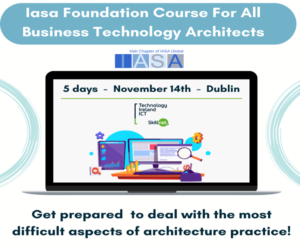- The ICT Skillnet course, IASA Foundation Course for All Business Technology Architects is a 5 day in-person training programme based in Dublin, starting 14th November 2022.
- It is suitable for anyone interested in becoming involved in IT architectural work and who has some knowledge and experience with IT systems development.
- Longer Term; The Online MSc In Software Solutions Architecture is a 2 year part time course, starting with an induction on the 20th of January and formally starting on Saturday The 21st of January.
What is Information Technology Architecture?
We hear a lot about IT architecture, yet frequently people are unclear as to what is actually involved in this discipline. In a nutshell, Information Technology (IT) architecture is both a job title and a broad set of principles used to design computer systems in line with best practice. Tactically, IT architecture describes how various software modules or components work together, as well as the logical relationships between them.
These principles apply to computers in general as well as specific IT functions such as networking and software development.
While there are many different IT architectural frameworks, they are all based on the common principle of creating an organised system that can be managed easily throughout its life cycle. This article gives an overview of what Information Technology Architecture covers, and it has been written to help you decide if you would like to further develop your skills in this field.
Importance of Information Technology Architecture
IT architecture involves a broad set of principles that describe how various software modules or components work together, as well as the logical relationships between them. In other words, it’s a blueprint of your organisation’s computer systems. These blueprints are common in the construction industry – they’re designed to ensure the safety of the building’s infrastructure, while making the design process easy by establishing a common set of rules and regulations. Computer systems are hugely complex and documenting and designing them in an effective way is essential to streamline operations and maximise efficiencies.
What are the types of IT architecture Frameworks?
There are many different IT architecture frameworks, but they can be broadly split into two categories – centralised and decentralised. Centralised architectures have all their hardware, software, and data housed in a few data centres. This doesn’t mean that everything is kept on one server – it just means that everything is controlled from one location. Centralised architectures are good for businesses that require high levels of security and availability, such as banks.
Decentralised architectures, on the other hand, house data across multiple data centres. This set-up is good for businesses that require high levels of scalability, such as software businesses.
What Skills Do I Need to Excel in IT Architecture?
Successful IT architects have a strong and broad knowledge of computer systems. They understand how networking, hardware, and software work in tandem, as well as how they differ from each other.
Great IT architects also have a sound knowledge of various programming languages and software development methodologies. Successful architects are able to think through how each component of the system fits together, as well as how they can be used to solve specific problems.
Most importantly, gifted IT architects can translate their knowledge into a clear and concise technical design document. This document should explain how each component of the system works in detail. It should also explain why each component is used over and above other options for the same set-up. The document should be easy to read and understand so that other members of the organisation can benefit from the IT architect’s knowledge.
How to Upskill in IT Architecture
ICT Skillnet offer a wide variety of courses and training programmes across all aspects of ICT, from Masters programmes to short 5 day courses.
These courses aim to give students a solid understanding of the foundational concepts of IT architecture. It’s founded on three major considerations in this field: Business, Technology Design & Delivery, and Stakeholders. Our courses in this area include:
Course name: IASA Foundation Course for All Business Technology Architects
Course dates: 14/11/22 – 18/11/22 (5 full days in-person)
Location: Dublin
Grant Aided Fee: €2000
How to Apply: Book a place on this course or view the course syllabus for more information.
Course name: MSc In Software Solutions Architecture (Online)
Course dates: 2-year course, starting January 20th 2023
Location: TU Dublin (Delivered Online)
Course Fee: €2,195
How to Apply: Book a place on this course or view the course syllabus for more information.






